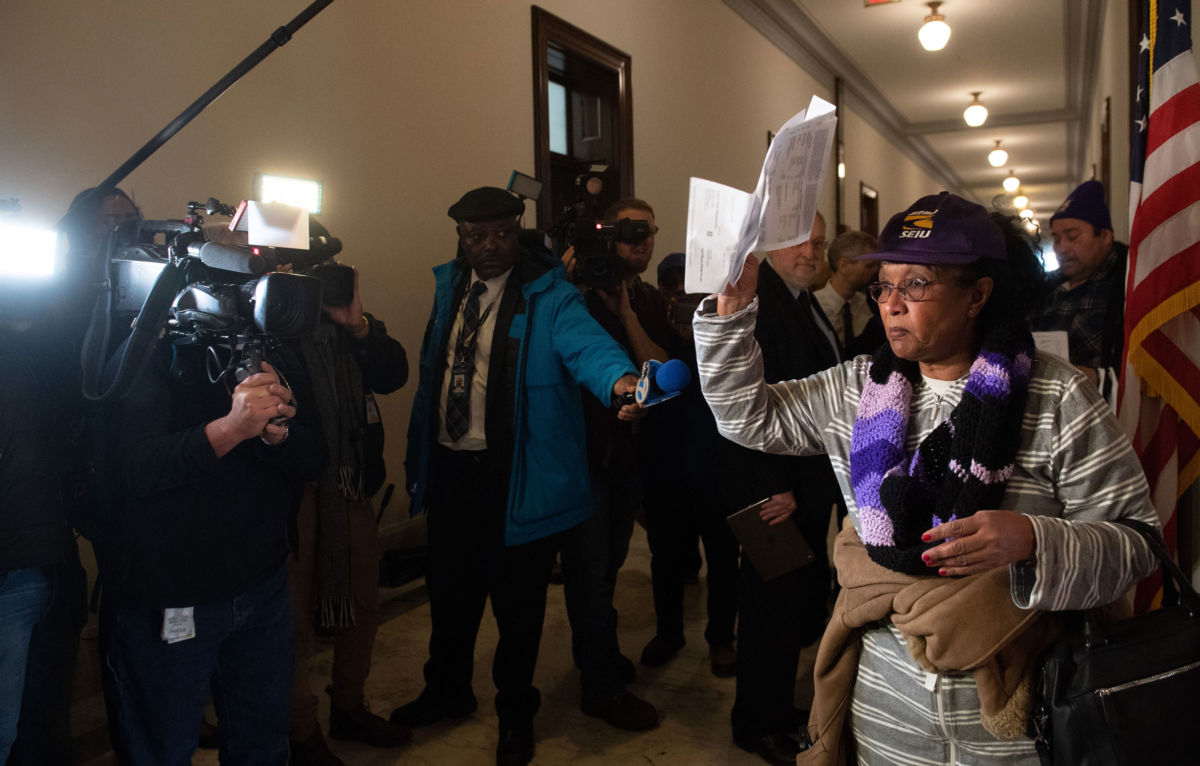As the government shutdown drags on, 800,000 federal workers continue to be furloughed or are working without pay. Even if they receive back pay at the end of the shutdown, it will be a case of “too little, too late”: Delayed pay cannot redress lost housing, late payment fees on bills or credit cards, unpaid child care bills, or the daily struggles of living paycheck to paycheck when those checks are delayed indefinitely.
But large numbers of people who do the work of the federal government are not directly employed by the federal government; they do work that the government has outsourced to private companies. Many of these workers may end up receiving no back pay at all.
These are the women and men who staff customer service lines, process payments, maintain properties, serve meals and provide tech support through government contracts with private employers. The number of affected workers is literally impossible to pinpoint, even for the government agencies signing the contracts. For every direct federal worker, we hire almost two more to execute such contracts, for a total of more than 3.7 million contracted employees, according to 2015 research estimates. Untold thousands of these employees have been locked out of work for temporarily shuttered agencies like the Departments of Transportation (with its $9.1 billion in contracts), Treasury ($13.9 billion in contracts) and Agriculture ($16.9 billion).
It is little surprise that President Trump and his allies on the political right have shown no real concern for these workers, who provide important public services and keep our systems running through private contracts. For nearly 60 years, big-name consulting and contracting firms like McKinsey, Booz Allen & Hamilton and United Technologies have profited from increased privatizing of public work under both parties while lawmakers crow about limiting the scope of government.
By establishing a contract award system that prioritizes the lowest price over any other measure of value, this privatization agenda has shifted work from decently paid, direct federal employment to private jobs where the same tasks and duties can result in 34 percent lower wages for those without college degrees. It has also exacerbated an already wide racial wealth gap by wiping out a historic source of middle-class jobs for Black Americans.
A few lawmakers are also speaking up for these privatized federal contract workers, but time is ticking away. Contractors have received stop-work orders, and many of the lowest-paid workers earn wages by the hour and so accrue no back pay during long shutdowns. Every day that the government is shut down is another drop into a financial hole for these workers and their families. (As a terrible aside, Trump used an executive order last year to undo regulations that would have provided pay transparency and safety guarantees for these workers.)
Some of these workers are employed by small contractors who may depend on a single contract with one agency to stay afloat. Businesses owned by women or people of color in particular tend to be “smaller and younger than other businesses” and have less ability to help employees when the government is closed. As one small contractor told reporters, she’s worried that her employees will find other jobs, “and now I’m going to be stuck with maybe no employees.” Outsourced workers are worried about being evicted, going through savings and even finding buyers for personal belongings as they struggle to stay afloat.
As the shutdown drags on, bills pile up and workers sit home worrying about the next financial catastrophe, we need to ensure that President Trump’s federal government shutdown does not destroy the livelihoods and well-being of tens of thousands of families. Federal contract workers are key to keeping our country running even if it doesn’t say US federal government on their pay stubs. They need their paychecks just as badly as their federally employed counterparts, and they deserve the same consideration when lawmakers fail to keep our government open.
Before Midnight: Last Chance to Have Your Gift Matched!
Before midnight tonight, all donations to Truthout will be matched dollar for dollar up to $11,000! Thanks to a generous supporter, your one-time gift today will be matched immediately. As well, your monthly donation will be matched for the whole first year, doubling your impact.
We have just a few hours left to raise $11,000 and receive the full match.
This matching gift comes at a critical time. As Trump attempts to silence dissenting voices and oppositional nonprofits, reader support is our best defense against the right-wing agenda.
Help Truthout confront Trump’s fascism in 2026, and have your donation matched now!
